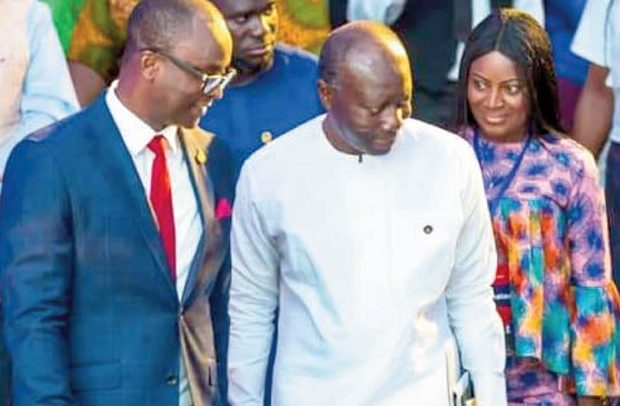Ken Ofori-Atta (middle) after delivering his address
Finance Minister Ken Ofori-Atta has stated that a whopping GH¢1.7 billion was committed to the free Senior High School (SHS) programme initiated by President Akufo-Addo in 2017.
The minister took a swipe at critics of the free SHS programme, particularly the National Democratic Congress (NDC), saying “the introduction of free SHS was not built on some pompous political agenda to grab social democratic narratives from those who surprisingly have shunned their ideology for quick wins.”
“For 2019 alone, a total amount of GH¢1.7 billion has been dedicated to free SHS,” he said, insisting that “President Nana Addo Akufo-Addo’s deliberate decision to provide free Senior High School education to the Ghanaian youth was made with the knowledge of the costs involved.”
Mr. Ofori-Atta disclosed this at an Economic Forum organized by the Danquah Institute (DI) in Accra on Friday under the theme: “Bridging the gap between the formal and informal economy: The role of domestic revenue mobilization in an era of Ghana Beyond Aid.”
He stressed that “this again underlines our belief that the development of the Ghanaian individual is the most important priority of government.”
Speaking at the University of Cape Coast (UCC) in the Central Region on Thursday, April 11, 2019, former President John Mahama, complained bitterly about the increased enrollment under the free SHS programme and government’s decision to invest GH¢2 billion into the initiative this year.
“What we are doing with this huge influx into the secondary school system [due to the free SHS programme]…is going to affect the quality of the public schools,” he said.
He went on to predict doom for the pro-poor programme, saying “and soon we are going to find a system where people lose faith in public schools and everybody will pay to take their wards to private secondary schools. That is the danger we are talking about.”
However, the Finance Minister said that “across Africa, people below 24 currently make up 60 per cent of the continent’s population,” adding “that is about 1.25 billion young people. This number is expected to escalate by over 50 per cent in the next 30 years by which time the job space would have changed beyond what we know now.”
He said “it makes both economic and social sense to zoom in on education to safeguard the future of jobs rather than sitting back, clocking short term wins that make for beautiful headlines, and leaving our young ones to brace themselves for an uncertain and confused future.”
The minister further said “with the changing employment space, developing our human capital through quality higher education provides the necessary building blocks to our future economic survival.”
By Melvin Tarlue


